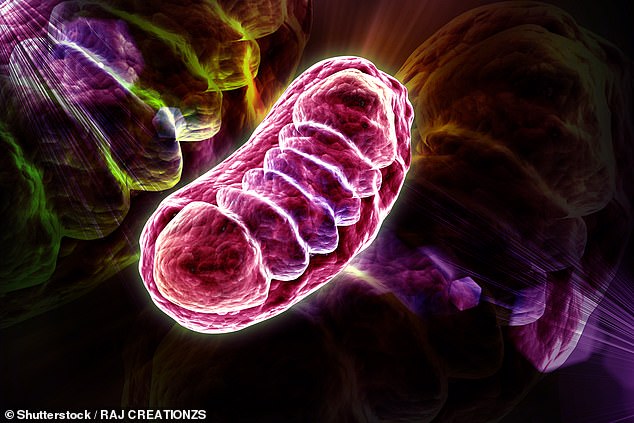Scientists have discovered a new ‘drug-like’ molecule that appears to slow aging by keeping the ‘powerhouse’ of cells healthy.
A team from the Buck Institute in California has identified a compound in plants that stimulates a cell’s waste and recycling center, which decreases as we age.
The team tested the bioactive compound with antioxidant and anti-inflammatory properties in small annelids, finding that their lives were extended by an average of 20 days, while some lived more than 30 days.
The compound, also found in cinnamon, achieved its feat in worms by acting on a receptor that humans also have a version of, suggesting that these results could extend to humans.

The mitochondria in our cells need to be cleaned out periodically. Scientists have discovered a naturally occurring molecule that speeds up this process
Gordon Lithgow, senior co-author, said: ‘There is a bottleneck in efforts to develop potential therapies in the geroscience field, and the bottleneck is that we don’t have enough molecules in the pipeline.
“MIC is a great candidate to advance given its therapeutic effect in multiple models and the fact that it is a naturally occurring molecule.”
Manish Chamoli, PhD, lead author of the study, said their work shows links between mitophagy, a cell’s waste and recycling center, suggesting that drugs that enhance this process could provide treatment far beyond neurodegeneration or muscle atrophy.
The study, published in Nature Aging, found that lifespan increased as the worms’ mitochondria function improved through the power of coumarin, a mitophagy-inducing compound (MIC).
Mitochondria are the powerhouse of the cell. These microscopic parts of cells produce the energy that cells need to do their work.
If they don’t work, life-threatening diseases can result. Even when functioning well, mitochondria can wear out.
At this point, cells have natural ways to sweep them away and recycle them in a process called ‘mitophagy’ – which essentially means ‘mitochondria eating’.
As we age, mitophagy slows down, causing a buildup of cellular waste.
This slowing has been implicated in several age-related diseases, including Parkinson’s disease, Alzheimer’s disease, heart failure, obesity and loss of muscle mass.
There are some ways to boost mitophagy, including starvation diets such as intermittent fasting, research suggests.
Studies in mice, worms and other animals support the idea that periodic or intermittent fasting – followed by a return to normal feeding – extend lifespan.
Some existing medications can do that too restore mitophagy to help fight certain types of cancer, but none are approved to slow aging.
In the new study, scientists took a new approach.
Looking for a way to encourage mitophagy in a small roundworm commonly used in scientific research, they began screening a vast collection of compounds on nerve cells in dishes to see which ones would stimulate mitophagy.
One, MIC, “became a big hit,” Julie Andersen said in one rack.
Andersen, who was a senior scientist on the study, conducts research in neurodegenerative diseases at the Buck Institute for Research on Aging in Novato, California.
MIC belongs to a class of molecules called coumarins, which occur naturally in cinnamon and tonka beans, among others.
“Rather than immediately putting MIC into a mouse model, we wanted to understand its impact on overall aging and identify its mechanism of action,” Andersen said, “so we took over the work in the worm, where we found that MIC occurs in is in a different class. of molecules that enhance the expression of a key protein, TFEB.’
TFEB makes an important contribution to the decluttering processes of cells. Defective TFEB production can lead to age-related conditions.
When Andersen and her team gave MIC to worms, mitophagy increased. And it did the same in cultured muscle cells from mice.
In the worms, MIC significantly extended lifespan compared to untreated worms.
Mic is “a promising drug-like molecule,” Andersen and her colleagues write in the study published Monday in the journal Nature Aging.
They discovered that it does this by acting upstream of TFEB by blocking the action of a receptor protein called DAF.
The human version of DAF, called FXR, regulates TFEB levels in the liver. But it is also present in brain cells, suggesting why MIC acts on TFEB.
“This study provides a new piece of the puzzle when it comes to understanding the brain-gut connection in terms of health and disease,” Andersen said.
Bile salts produced in the intestines keep FXR levels in check, so if the microbiome is out of balance, which can happen due to aging, mitophagy can be affected over time.
And because neurons in the brain are maintained by a large number of mitochondria, reduced mitophagy has an outsized effect on brain health.
Ongoing experiments look at the role of FXR in Alzheimer’s disease.
MIC isn’t yet available as a supplement you can take to slow aging, so for now you’re stuck with the basics to support healthy aging: sleep, diet, and exercise.



